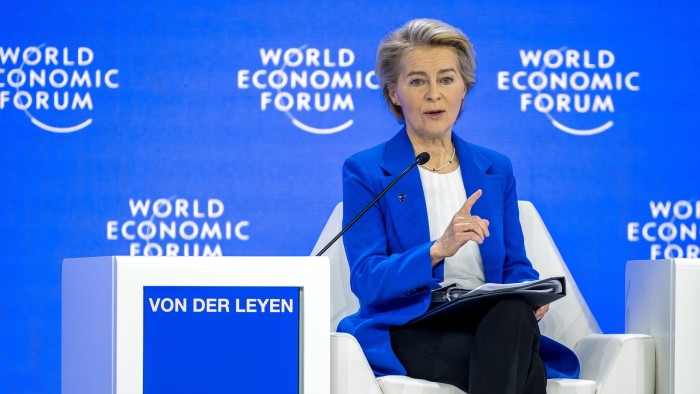Stay informed with free updates
Simply sign up to the EU business regulation myFT Digest — delivered directly to your inbox.
Big businesses and national governments are heaping pressure on Brussels to cut back its sustainability agenda amid fierce debate about the impact of Donald Trump’s deregulation drive on the EU.
The latest call for reform of rules that companies say are choking investment came from US oil and gas group ExxonMobil. Europe president Philippe Ducom said “very little” of the €30bn it had earmarked for investment in technologies, such as hydrogen and carbon capture, would come to Europe as a result of its “frivolous, excessive and expensive regulation”.
“A lot of what Europe is doing is trying to do the right thing but doing it the wrong way,” Ducom told the Financial Times.
The influential European Roundtable for Industry, which counts the bloc’s biggest industrial, consumer and energy companies among its members, was also heavily critical in its latest position paper of the regulations that are designed to tackle climate change and improve corporate behaviour and investment.
“There are too many complex and generally vague definitions and terms, as well as unclear reporting scopes and disclosure requirements,” it said.
European Commission president Ursula von der Leyen was urged by business leaders in Davos last week to swiftly ease the regulatory burden on companies. One European chief executive said Europe was “losing competitiveness everyday”. Another said it was imperative to change the perception of US financiers who considered Europe to be “uninvestable” at the moment.
Von der Leyen has made simplification of sustainability reporting a central aim of her second term at the head of the EU executive. But businesses and governments are increasingly concerned that this will not be enough to safeguard the bloc’s competitiveness, particularly given President Trump’s tax and rule-cutting agenda in the US.
Among the national governments increasingly piling pressure on Brussels, France last week called for a “massive regulatory pause” on legislation covering everything from chemicals to financial directives.
German chancellor Olaf Scholz, who faces elections in February, wrote to the European Commission this month to call for a two year delay to stricter corporate sustainability reporting rules, which begin to take effect from January this year for the largest companies.
The push marks a stark reversal by EU leaders, who had previously backed a robust climate change plan led by tighter rules for companies to encourage them to tackle the pollution behind global warming.
In 2022, French President Emmanuel Macron hailed the sustainability reporting rules as a way to “reform capitalism”.
But a flagging economy and pressure from rightwing parties, as well as the challenge from the new US administration have forced EU policymakers to confront the backlash.
Trump criticised EU legislation as “very cumbersome” in a video address to the World Economic Forum last week, which also attacked the bloc over its tax and trade regime and touted his own deregulation drive.
Von der Leyen acknowledged that “too many firms are holding back investment in Europe because of unnecessary red tape”, in her own remarks delivered in Davos. The commission would launch a “far-reaching simplification of our sustainable finance and due diligence rules”, she promised.
A proposal laying out cuts to corporate reporting rules in three major directives — sustainability reporting, supply chain laws covering environmental and human rights abuse, and green definitions for investing — is due in February.
The commission has said it will cut 25 per cent of reporting requirements for larger companies and 35 per cent for small businesses, according to a draft document outlining plans to improve EU competitiveness.
The revisions have already prompted divisions within the commission and among member states and lawmakers, however, particularly from countries where companies have already prepared for the new reporting rules.
“We need to do something but also it’s about predictability [for businesses],” another senior EU diplomat said.
Experts are also concerned that due to the pressure from the US, Brussels will be pushed to backtrack too far.
Martin Porter, executive chair of the Cambridge Institute for Sustainability Leadership, said there was a “clear risk” that “a broad simplification agenda unravels policies which businesses have already invested against”.
This ran counter to the EU’s overarching aim to use sustainability as a competitive advantage that would help its economy to grow, he added.
Additional reporting by Ben Hall
Read the full article here

